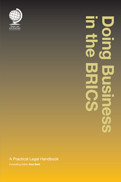
Consulting editor(s): Rebecca Normand-Hochman
Publication date: Oct 2014
Format: Hardback
Pages: 214
Price: £118.00
Discounted Price: £70.80
ISBN: 9781909416413
How our eBook platform works
How permanent access, multi-user eBooks work
Add to basket (UK and Europe)Add to basket (USA, rest of world)
Add to basket (UK and Europe)Add to basket (USA, rest of world)
No matter how successful, the often perplexed lawyer, at whatever stage of his or her career, requires some encouragement and guidance along the way, hence the increasingly urgent need for mentoring and coaching examined in this book.
,
'Mentoring and Coaching for Lawyers' not only answers the many questions I had, but does so in a structured, substantial and yet an imaginative and creative way. Its structure means that it is easy to access and would make a helpful reference book, for all those involved in law firm management.
,
Review for 'Managing Talent for Success': This is a concentrated burst of thoughtful analysis and practical pointers. Self-contained chapters draw on the insights and experience of a credible cross-section of specialists in talent development.
,
Traditional forms of mentoring and coaching have always been at the heart of the legal profession. It is not so long ago that in order to become a lawyer, one did not attend law school, but instead had to be mentored by a senior member of the profession for a fixed number of years. The requirement to attend law school is now universal, but the need for mentoring and coaching in the legal profession has not disappeared; it is developing at a high speed and for good reasons.
Misconceptions about mentoring and coaching in law firms often prevent productive relationships from forming. These misconceptions include beliefs that mentoring is beneficial to mentees but does not add value to the mentors; an assumption that it is human resources’ responsibility to develop people; and queries about why today’s lawyers need coaching, given that they receive more formal training than previous generations.
This practical handbook, coordinated by Rebecca Normand-Hochman on behalf of the International Bar Association, explores and challenges some of these assumptions. Featuring chapters by well-respected experts in the field of mentoring and coaching, chapters cover topics including leadership coaching for law firm leaders; mentoring and coaching for lawyers at various stages of their careers; and mentoring and coaching for successful onboarding of lawyers, among other topics.
The various chapters provide guidance and insight to law firm leaders and talent management managers for them to discover how they can turn mentoring and coaching into a source of competitive advantage by improving client service, attracting and retaining the best talent, and enhancing the utilisation of human capital.
The book will also be of interest to lawyers seeking to discover how they can generate productive relationships to acquire the intangible skills and knowledge required to excel in today’s practice of law.



















